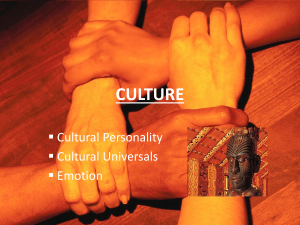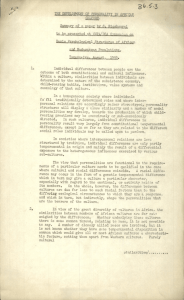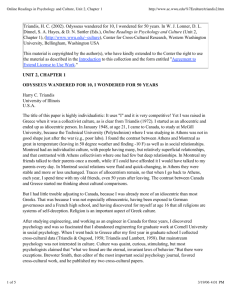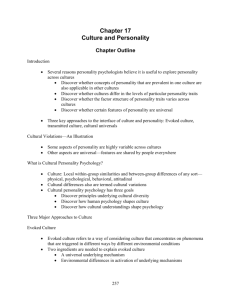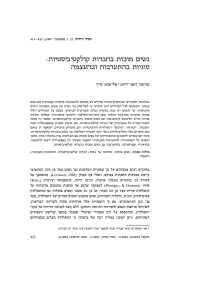Culture and Personality
advertisement
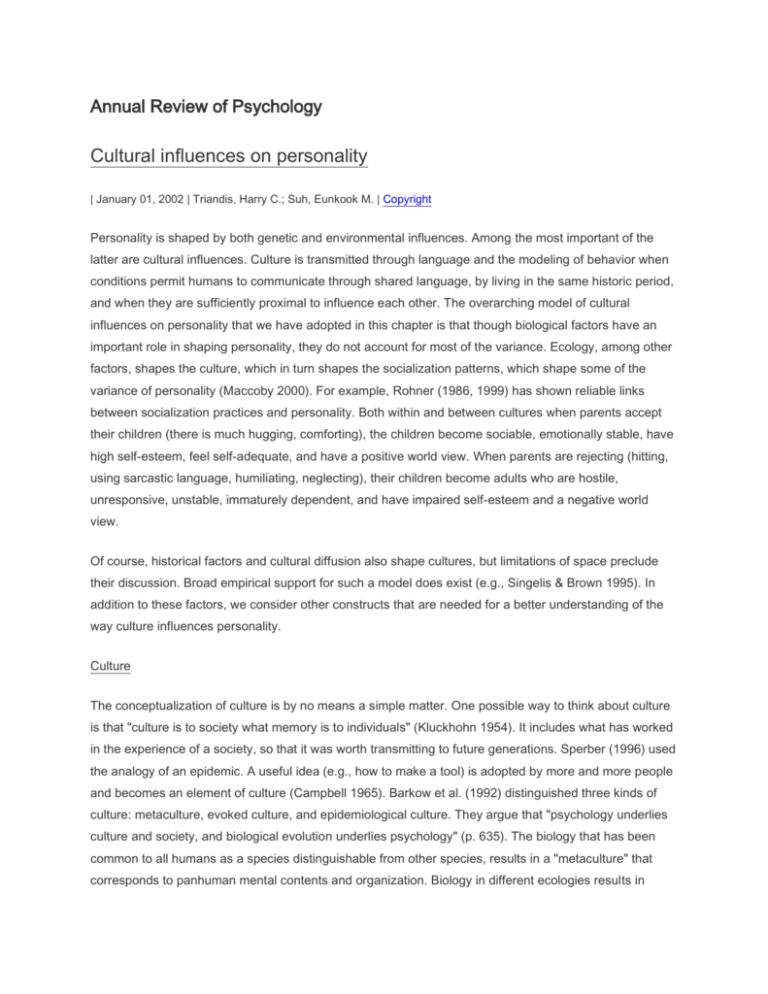
Annual Review of Psychology Cultural influences on personality | January 01, 2002 | Triandis, Harry C.; Suh, Eunkook M. | Copyright Personality is shaped by both genetic and environmental influences. Among the most important of the latter are cultural influences. Culture is transmitted through language and the modeling of behavior when conditions permit humans to communicate through shared language, by living in the same historic period, and when they are sufficiently proximal to influence each other. The overarching model of cultural influences on personality that we have adopted in this chapter is that though biological factors have an important role in shaping personality, they do not account for most of the variance. Ecology, among other factors, shapes the culture, which in turn shapes the socialization patterns, which shape some of the variance of personality (Maccoby 2000). For example, Rohner (1986, 1999) has shown reliable links between socialization practices and personality. Both within and between cultures when parents accept their children (there is much hugging, comforting), the children become sociable, emotionally stable, have high self-esteem, feel self-adequate, and have a positive world view. When parents are rejecting (hitting, using sarcastic language, humiliating, neglecting), their children become adults who are hostile, unresponsive, unstable, immaturely dependent, and have impaired self-esteem and a negative world view. Of course, historical factors and cultural diffusion also shape cultures, but limitations of space preclude their discussion. Broad empirical support for such a model does exist (e.g., Singelis & Brown 1995). In addition to these factors, we consider other constructs that are needed for a better understanding of the way culture influences personality. Culture The conceptualization of culture is by no means a simple matter. One possible way to think about culture is that "culture is to society what memory is to individuals" (Kluckhohn 1954). It includes what has worked in the experience of a society, so that it was worth transmitting to future generations. Sperber (1996) used the analogy of an epidemic. A useful idea (e.g., how to make a tool) is adopted by more and more people and becomes an element of culture (Campbell 1965). Barkow et al. (1992) distinguished three kinds of culture: metaculture, evoked culture, and epidemiological culture. They argue that "psychology underlies culture and society, and biological evolution underlies psychology" (p. 635). The biology that has been common to all humans as a species distinguishable from other species, results in a "metaculture" that corresponds to panhuman mental contents and organization. Biology in different ecologies results in "evoked culture" (e.g., hot climate leads to light clothing), which reflects domain-specific mechanisms that are triggered by local circumstances, and leads to within-group similarities and between-groups differences. What Sperber describes, Barkow et al. call "epidemiological culture." Elements of culture are shared standard operating procedures, unstated assumptions, tools, norms, values, habits about sampling the environment, and the like. Because perception and cognition depend on the information that is sampled from the environment and are fundamental psychological processes, this culturally influenced sampling of information is of particular interest to psychologists. Cultures develop conventions for sampling information and determine how much to weigh the sampled elements from the environment (Triandis 1989). For example, people in hierarchical cultures are more likely to sample clues about hierarchy than clues about aesthetics. Triandis (1989) argued that people in individualist cultures, such as those of North and Western Europe and North America, sample with high probability elements of the personal self (e.g., "I am busy, I am kind"). People from collectivist cultures, such as those of Asia, Africa, and South America, tend to sample mostly elements of the collective self (e.g., "my family thinks I am too busy, my co-workers think I am kind") (Triandis et al. 1990, Trafimow et al. 1991).


